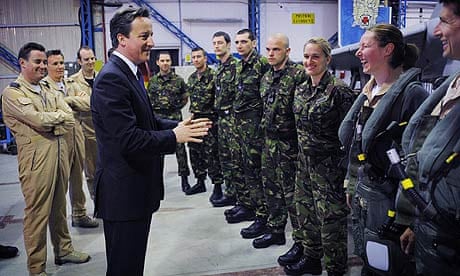The UK and other European countries must use the money saved by withdrawing from Afghanistan to re-equip their military and help reverse worrying cuts in defence spending, the American ambassador to Nato will warn on Tuesday.
Ivo Daalder said if Europe did not invest in new capabilities, its over-reliance on America would continue at a time when Washington had made the far east and China its new strategic priority.
"If we don't start soon in investing in those capabilities then the gap between the US and the rest is going to grow. And if it is bad now, then it will be worse. If we have problems, they will be even worse."
The ambassador's remarks come as the UK and the US prepare to withdraw thousands of troops from Afghanistan in 2013 in advance of the deadline to end all combat operations by the end of 2014.
Two weeks ago, David Cameron announced that 3,800 British personnel would withdraw from Helmand province in the next 12 months, and later hinted that the total could be higher.
The Ministry of Defence budget has been under huge strain over the past two years and Treasury officials have been privately urging the prime minister to speed up the withdrawal to cut costs.
But Daalder believes Nato allies should plough these savings back into military equipment that is urgently needed to maintain the organisation's strength.
He said last year's Libya campaign had shown Nato was capable of reacting quickly and effectively to a crisis, but warned it had also exposed "worrisome trends" in Europe's ability to act without relying heavily on US help.
If this is not addressed, he said, Nato would not be able to undertake a Libya-style campaign again in 10 years' time.
His remarks offer a stark warning to European governments about cuts in defence spending at a time of turmoil in Syria and across the Middle East.
He revealed the US had sold some advanced munitions to Nato during the Libya campaign because European stockpiles were running out, and there were a "number of other critical capabilities that the US provided in spades".
"In the end we had enough and we were able to resupply and sell equipment," said Daalder. "But it did demonstrate that stocks of equipment had run out and that people were not investing sufficiently to have these capabilities."
For this reason, he said, countries withdrawing troops from Afghanistan should not use the peace dividend to spend on other parts of their budgets.
"That investment, that cost of the operations in Afghanistan [should] be retained and be reinvested in re-equipping the force, investing in new capabilities down the line. What we don't want to see is, as the troops come home because the job is done, we take those savings and pump them into other parts of the budget. We would like those savings to be reinvested in real capabilities because, in part, the expenditure on Afghanistan has come at the cost of procuring new capabilities."
Daalder's remarks reflect concern in the US that Europe cannot wean itself off American military help. The White House wants Europe to shoulder more of the burden to keep Nato robust.
Daalder said the lack of munitions for the air campaign over Libya was "a signal that there is a lack of investment in critical core capabilities by the alliance, and that the continuing cuts in defence spending raise, over time, serious questions about sustainability.
"Not whether we can start a conflict, but whether we can sustain a large-scale conflict over time. Those are the kinds of issues we focused on in the aftermath of the Libya war and are now on the agenda."
Daalder added: "We can squeeze a lot from better co-operation, working together and smart defence. But at some point output is determined by input, and here the trend is, frankly, not good.
"The amount of resources and investment in defences is declining and has declined. If current trends continue, in 10 years from now this alliance would not have been able to mount the kind of campaign it did in Libya. The real question for the alliance is, when are the spending patterns going to be reversed, so that you can build that sustainable force that is capable of fighting wars and conducting operations without having to rely solely on the US for its core capability?
"That is the challenge for the remainder of this decade."
Nato countries are supposed to commit 2% of their GDP to defence spending, but Daalder said only three – the UK, Greece and Macedonia – were at this level. The US, he said, accounted for 75% of Nato's budget and spent 4% of its GDP on defence.
This month, Philip Hammond, the defence secretary, said Germany needed to do more for Nato, but Daalder said no one country could solve the problem.
"The issue is not just Germany doing more, it is everyone doing more. There isn't a single country in this alliance that spends more than 2% [on its military]. In fact, only three countries right now spend 2%. Far more countries are closer to 1%.
"That is really where the rub is. Yes, Germany needs to do more, but it is not just Germany. I don't think the solution is to point the finger at one country and say: 'If only they did more the alliance would be in better shape.'
"I do think frankly the issue is that all of us – that includes the UK and France – are looking at savings by cutting defence at a time when the balance between European and US investment has shifted dramatically in favour of the US. Not just because the US is spending more, but because Europe is spending less."
Daalder said he expected defence spending to return to previous levels once economies start to grow again.
"We recognise that we are all going through tough financial times. Under those circumstances the ability to spend more on defence is constrained. We do expect that once growth resumes that the level of spending on defence will go back to levels that we have seen before.
"The current ceilings should not become the new ceilings, but floors from which we will build up. We can live where we are today, not comfortably. But looking to the future, when growth picks up, so should defence spending. As the cost of the Afghan war goes down, those savings are to be reinvested in real capability."
According to MoD figures, the UK spent £4.1bn on its military effort in Afghanistan in 2011-12. This will fall to £3.6bn in 2013. The Treasury has been pushing for an early withdrawal from Afghanistan to save money and has no plans to increase spending on defence.





Comments (…)
Sign in or create your Guardian account to join the discussion